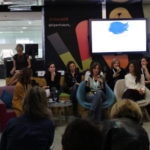The female voice of ‘Data Science’
Of the 1,586 craters in the Moon named after scientists, only 28 of them have been named after a woman. A revealing figure to kick off the Women in Data Science (WiDS) event in Madrid, organized by Stanford University to promote women’s work in a new field that is disrupting industries across the world.

“Data science is changing business models. It poses new ethical challenges and conflicts and us women need to raise our voice to influence the new world that is right around the corner,” said Carme Artigas, Chairwoman of Synergic Partners, who brought this event to Madrid in her capacity as WiDS ambassador.
“Now’s the time to make an impact on the fourth industrial revolution,” insisted Artigas, who revealed that women already account for 30% of the workforce in science and technology industries. Big data, machine learning and Artificial Intelligence are emerging as the branches of knowledge that will shape the new era. And there are still many things that need to be done and thought about in this respect.
Amparo Alonso, of the University of La Coruña, and coordinator of LIDIA, a research and artificial intelligence group, believes that society as a whole will need time to adapt to the changes that Artificial Intelligence is going to bring, which in her opinion is going to destroy many jobs, while opening new professional fields that don’t exist today. “Algorithms enhance our capabilities as a civilization,” said Alonso, who is optimistic about the new opportunities that these technologies open to make progress in all areas of activity.
“Artificial Intelligence is just a step in the automation process,” emphasized Angela Shen-Hsieh, current Head of Product Innovation at Telefónica R&D, and former IBM employee, where she worked in the development of its Watson supercomputer’s ability to interact through conversations.
Elena Alfaro, CEO of BBVA Data & Analytics, confirmed the growing presence of women in data science: one-third of employees at BBVA’s analytical excellence center are women. Alfaro highlighted how data sciences applied to business are going to translate into companies “making data-driven decisions, and in the future decision-making processes will be completely eliminated, as a result of this automation,” she concluded.

Elena Alfaro, CEO of BBVA Data & Analytics
In Pepsico, as Nuria Bombardó noted, all decisions are already subject to its business data analysis department’s scrutiny. “Any decision is made based on these facts, extracted from the analysis of point-of-sale specific data,” explained Bombardó, who believes that, in the trade and distribution sector, data already define many business strategies.
Back in Spain, Gas Natural Fenosa is also focusing on data analytics to offer a better service to its customers. “We want to offer energy advice to our customers to help them curb consumption, enjoy better rates, or contract the type of service they really need,” said Rosa Sanz, Head of People and Resources at the power utility.
Fintech Regulations
Digital Origin also wanted to showcase the vision of female entrepreneurs, in this case in the fintech industry; an area were female talent is underrepresented. Marta Plana, Head of Digital Origin, explained that, beyond gender inequality, one of the biggest concerns of the sector is regulation. “We want a supervisory regulation that allows us to compete in a level playing field,” said Plans, in reference to the white paper on Fintech, where fintech startup sector has set forth its demands.
Elena Alfaro joined this petition, on the side of the banking industry, which suffers other limitations precisely because regulations fail to adapt fast enough to the new technological and innovation requirements posed by the industry’s transformation.
In this transformation, women want their voices to be heard and become a pivotal part of a more diverse fourth industrial revolution, as evidenced over the course of the 75 WiDS meetings held across the world on that same day.

Women in Data Science Madrid
The list of to-do’s
High in the order of priorities in the list of to-do’s is bringing girls closer to science from school. In fact, the UN has declared next February 11 the new International Day of Women and Girls in Science.
Another pending task is awakening the entrepreneurial spirit of young women. According to Telefónica Open Future (TOF) data, female entrepreneurs are still a rare thing in the business world (less than 5% of startups are founded or co-founded by a woman). And data show that this is an error. “We have seen that startups with women in their founder team are more likely to succeed,” says Ana Segurado, Head of TOF.